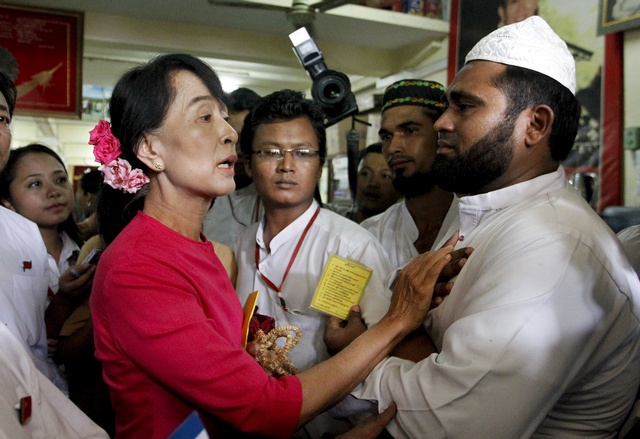Burmese state media has issued a retraction for the use of racially offensive language in its official appeal for calm after sectarian violence saw ten Muslims brutally killed by an angry mob on Sunday in Arakan state.
A government statement published in the New Light of Myanmar on Tuesday warned against “anarchic and lawless” acts, but attracted a virulent backlash for referring to the victims as “kalar” – a racial slur for Muslims or persons of Indian appearance.
In a correction published today, the government paper urged readers to refer to the victims as “Islamic residents”.
Dozens of people took to the streets in Rangoon yesterday to protest growing anti-Muslim violence and accused the government of fanning the flames of sectarian tensions. Political leaders and civil society groups appealed for calm and called on the government to issue an apology.
“The newspapers should not stoke this conflict. Are they trying to suggest that one race is more violent than others?” said ethnic Arakanese MP Aye Maung from the Rakhine Nationalities Development Party.
Religious tensions have flared in Arakan state after three Muslim men were accused of the gang rape and murder of an ethnic Rakhine girl. It culminated in a bloody massacre on Sunday, when an angry mob set upon a bus filled with Muslim pilgrims and beat ten of them to death before setting the vehicle ablaze and defiling their corpses.
The violence has once again brought to the fore allegations of entrenched racism in Burmese society, particularly targeted against Muslims and the much-persecuted Rohingya minority group – dismissed as “illegal Bengali immigrants” by the government.
Democracy icon Aung San Suu Kyi today finally threw her voice into the debate, calling for the perpetrators to be held to account in accordance with the rule of law. She added that “the majority of the people in a society should have sympathy for the minority.”
“Maybe some people wouldn’t like me saying this but I have to say what I must say regardless of whether they like it or not. When you are the majority in a society, then you are the strong party. If you are strong then you must be generous and sympathetic. I would like to see all people in Burma get along with each other regardless of their religion and ethnicity.”
In the past, Suu Kyi and her National League for Democracy has carefully steered clear of discussing Burma’s Muslim minority, especially the Rohingya, which is seen a hot-button political issue that risks alienating many of its supporters.
A joint statement issued by several Rohingya and human rights groups on Monday also called for religious tolerance and reconciliation.
“The government is fully responsible for the law and order situation in the whole country. It should not make the Muslims scapegoats, but it has full responsibility to protect the rights, honour and dignity of all citizens,” they said.



